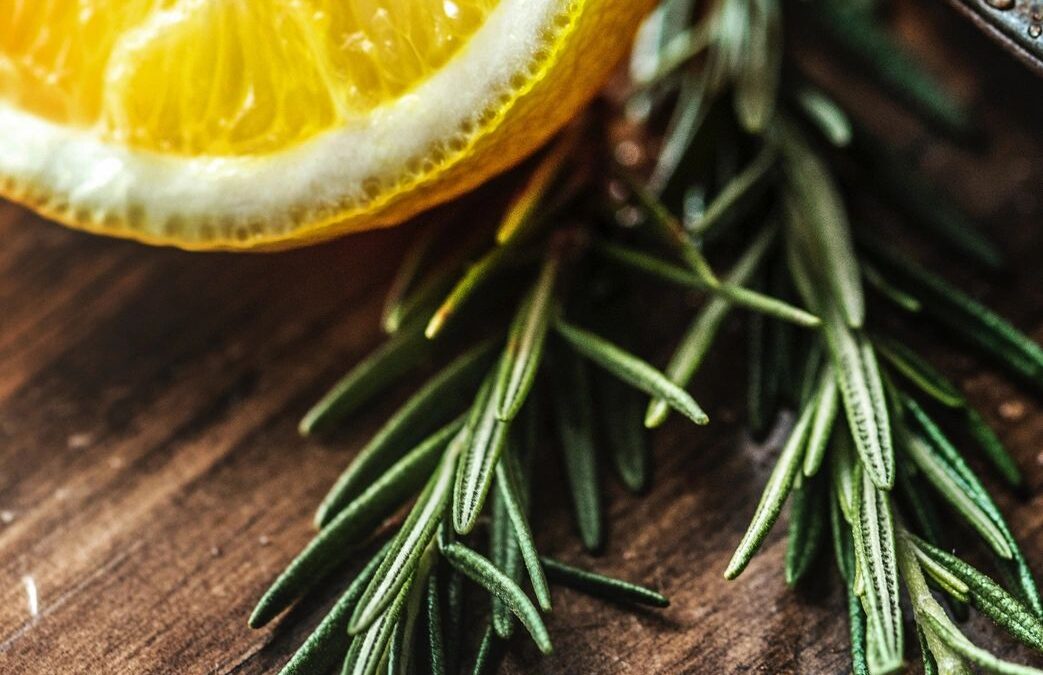
by Jessie Manderson | May 10, 2020 | Fitness
Micronutrients include vitamins and minerals. Vitamins are necessary for energy production, immunity and blood clotting. Minerals help with growth, fluid balance and bone health.
Minerals include:
Calcium for a healthy nervous system, muscles and hormones.

- Not enough can result in poor bone metabolism; muscle stiffness/cramps and low blood pressure.
- Too much can cause nausea/vomitting; constipation; dry mouth and thirst and kidney problems.
- Calcium can be found in dairy, dark green leafy vegetables, nuts + seeds, beans, rhubarb and fish.
Chlorides for digestion + absorption of other nutrients and minerals.
- Most people aren’t deficient in chlorides as they are found in most foods.
Chromium to support the effects of insulin.
- This can be found in broccoli, mushrooms, potatoes, oats, prunes, nuts and yeast, beer and red wine, aged cheese, beef and organ meats.

Copper helps collagen and elastin.
- Too much can cause nausea/vomiting; abdominal pain;diarrhea and liver damage.
- Not enough can cause anemia, loss of skin and hair color.
- You can find copper in cacao, mushrooms, nuts + seeds, beans + legumes, beef liver and seafood (oysters).
Iodine for growth + thyroid.
- Too much can cause burning in the mouth/throat/stomach; fever; diarrhea and enlarged thyroid.
- Not enough can cause impaired growth and neurological development and decreased production of thyroid hormones.
- Iodine can be found in saltwater fish + seafood, iodized salt, dairy and eggs.
Iron for respiration.
- Forms your red blood cells and vessels; produces energy and makes hundreds of proteins.
- Is better absorbed when taken with Vitamin C (we will get into vitamins in a minute). Not enough can cause low immunity; koilonychia (spoon shaped nails); behavioral abnormalities; anemia
- Too much can cause nausea/vomiting; shock; potential death; high risk of cancer and can be poisonous to children who overeat vitamins.
Magnesium for wound healing, fights depression, reduces insulin resistance, has anti-inflammatory effects, helps with muscle cramps, anxiety + sleep.
- Not enough may cause muscle cramps/twitching; nausea/loss of appetite; abnormal heart rhythms and affect your thinking, moods and memory.
- Too much can cause diarrhea, sleepiness, low blood pressure and shortness of breath.
- You can get magnesium from beans + legumes, dark leafy vegetables, nuts + seeds, cacao, potatoes and whole grains.
Manganese for antioxidation and metabolizing carbohydrates, amino acids (proteins) + cholesterol.
- It can be found in teas, nuts, dark leafy greens, seaweed, cacao, beans + legumes, whole grains (oats, barley), peppers, garlic, mushroom, onions, berries, pineapple and okra.
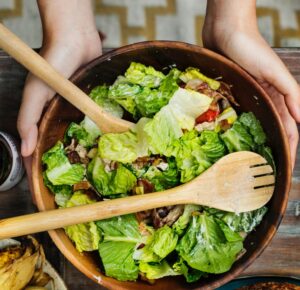
Molybdenum for removing toxins in the body, arthritis + balancing uric acid (leads to gout).
- Found in legumes, almonds + peanuts, green vegetables, oats, yogurt, potatoes + bread.
Phosphorus for bone formation; hormone production and regulating oxygen in the body.
- You can find phosphorus in beans + legumes, nuts + seeds, cheese (especially ricotta – yum!), fish, beef + eggs.
Potassium for balancing sodium and regulating blood pressure.
- Not enough can cause cardiac arrhythmia, muscle cramps, high blood pressure, glucose intolerance, kidney stones + bone loss.
- Too much can cause tingling, muscle weakness, nausea/vomiting, diarrhea + cardiac arrhythmia (which is why balance is important!)
- Potassium can be found in fruit + vegetables, beans + legumes, whole grains + potatoes and dairy + fish.
Selenium for type two diabetes, and is a powerful antioxidant.
- Not enough can cause skeletal and connective tissue issues; growth problems and arthritis.
- Too much can cause fatigue; skin issues; brittle hair + nails and a garlic odor on skin!
- You can get selenium from brazil nuts, whole grains (whole wheat + brown rice), eggs, fish + seafood, sunflower seeds, poultry + red meat.
Sodium regulates fluid, blood pressed and blood volume.
- Not enough can cause nausea/vomiting; cramps; fatigue; disorientaiton.
- Too much can cause increased fluid volume and edema; diarrhea/nausea/vomiting and abdominal cramps.
Sulfur acts as a liver detox and antioxidant.
- You can find it in protein dense foods (meats, fish and eggs), garlic + onions and cruciferous vegetables.
Zinc is good for growth + development; neurological function; immunity; reproduction and healthy cells.
- Too much can cause you to be deficient in copper as it blocks the absorption.
- Not enough can cause delayed growth and sexual maturation; low immunity; night blindness; hair loss; dry eyes and acne.
- You can find zinc in beans + legumes, nuts + seeds, whole grains (quinoa, rye, wild rice), seafood, beef/lamb/pork/poultry/wild game, eggs and mushrooms.
Minerals are SO important as you can see!It is important that you’re eating your macronutrients with them. Especially protein as the amino acids bind to minerals to ensure they work. Minerals survive cooking + storage unlike vitamins that are best eaten raw.
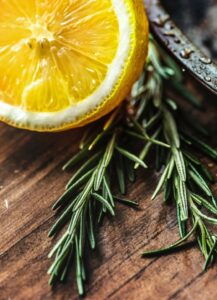
Vitamin A for sight and red blood cell development.
- Too much can cause nausea, headaches, fatigue, loss of appetite, dizziness, dry skin + birth defects.
- Not enough can cause issues with eyesight, dry eyes, rough/dry skin + acne.
- You can find A in red, orange and yellow fruits + vegetables; dark leafy greens, liver + egg yolk.
Vitamin B₁ for producing energy and aiding in diabetic retinopathy and nephropathy.
- People who aren’t getting enough may be suffering from a burning feet sensation, rapid heart rate, nausea and fatigue, GI distress and nystragmus (eye twitching). Alcoholics may have trouble with absorbing B₁.
- You can get it from beans + legumes, sunflower seeds, tahini, marmite, nutritional yeast, whole grains (oats + barley).
Vitamin B₂ regulates other B Vitamins. Oral contreceptives can interfere with the absorption.
- Not enough results in damage to skin membranes, conjunctivitis, light sensitivity, anxiety, loss of appetite and fatigue. B₂ helps to neutralize antioxidants, maintaining health of skin, nervous system and GI tract.
- You can get B₂ from soybeans mushrooms, spinach, eggs, almonds, whole grains (wheat), shrimp, beef liver, dairy and nutritional yeast.

Vitamin B₃ is involved in DNA repair, maintaining health of skin, digestive system + nervous system. It also helps to control cholesterol levels.
- Not enough results in damage to skin membrane, diarrhea and dementia.
- Too much can cause nausea/diarrhea/headaches, liver toxicity, insulin resistance and flushing of skin.
- You can get B₃ from whole grains (wheat + buckwheat), mushrooms, canned tomato products, beef, pork, liver, fish and chicken.
Vitamin B₅ helps maintain healthy skin.
- Not enough can cause tingly feet or in severe cases, malnutrition.
- Too much can give you nausea/diarrhea and/or heart burn.
- You can find B₅ in mushrooms, corn, avocados, peas, lentils, egg yolk, beef liver, poultry, yogurt fish + seafood and potatoes + sweet potatoes.
Vitamin B₆ is good for your nervous + immune system and red blood cell metabolism.
- Too little may cause damage to the nervous system; cause anxiety; sleepiness and irritability; confusion; depression and anemia.
- Too much can cause pain and neurological symptoms (carpal tunnel)
- You can get B₆ from potatoes + sweet potatoes, bananas + plantains, sunflower seeds, chickpeas, spinach, fish, pork, beef + poultry.
 Vitamin B₇ involved in DNA replication + transcription.
Vitamin B₇ involved in DNA replication + transcription.
- Not enough can result in dry/rashy skin; nausea/loss of appetite, hair loss/thinning, conjunctivitis and depression.
- You can find B₇ in foods such as nuts, sweet potatoes, onions, mushrooms, cacao, tomatoes, whole grains (oats), beans + legumes, egg yolk, dairy, liver, fish + pork.
Vitamin B₉ (folate) important for pregnant women and fetal development.
- Not enough can give you a low white blood cell count; weakness + weight loss; cracking; redness of tongue and mouth; low birth rate; premature pregnancy; neural tube defects in newborn.
- You can get them from beans + legumes, green leafy vegetables, chicken + liver.
Vitamin B₁₂ forms and maintains healthy red blood cells and nervous system.
- Found only in animal products, plant based eaters may need to supplement.
- Not enough can result in neurological problems; megaloblastic anemia; loss of appetite/weight loss; depression or mouth inflammation.
- You get B₁₂ from fish, shellfish, beef (especially liver) and dairy.
Choline – neither a vitamin or mineral but is grouped with vitamin B complex as there are many similarities.
- Lowers inflammation; involved in muscle impulse and controlling homocysteine levels (a common amino acid in your blood).
- Too much can give you trimethylaminuria (a fishy smell) and hypotension.
- Too little may cause issues metabolizing fat; liver/kidney disease; muscle/tissue damage and cognitive + memory problems.
Vitamin C protects cells from free radicals (antioxidants); improves iron absorption; regenerates vitamin E; aids in building collagen and metabolizes cholesterol.
- Not enough results in poor dental health and poor wound healing.
- Too much may cause diarrhea and kidney stones.
- You can get it from most colorful fruits + vegetables and organ meats.
Vitamin D helps in maintaining calcium; immune system functioning; regulating glucose tolerance and blood pressure.
- Not enough may cause tooth decay; low bone density; rickets; soft teeth; retarded growth.
- Too much may cause and increase in blood calcium; loss of appetite; nausea/vomiting; fluid imbalances; itching and muscle weakness; disorientation and calcification of soft tissues.
- You get it from fish, egg yolk, shrimp, mushrooms, beef liver, dairy, spinach + kale and the SUN!
Vitamin E assists in scavenging free radicals (antioxidants) and decreasing risk of inflammation in cells.
- Too much can cause blood clotting if it interferes with vitamin K.
- Not enough can make your muscles feel weak; cause damage to red blood cells; create issues with coordination; impaired vision and acne.
Vitamin K₁ (found in plants) + K₂ (found in animals).
- Too much can negate clotting + K₃ is toxic to the body!
- Not enough could cause bleeding; hemorrhage + bruising; anemia and too much calcium in blood.
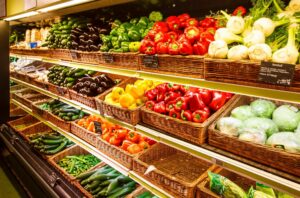
These are required in small amounts and can be found in common foods. It can be problematic to have too many or too little.
They are equally as important as macronutrients as you can see. They perform hundreds of roles in your body and are considered essential nutrients.
Make sure you’re getting enough and if you need help figuring out what works best for you, sign up with me today!
Jess x
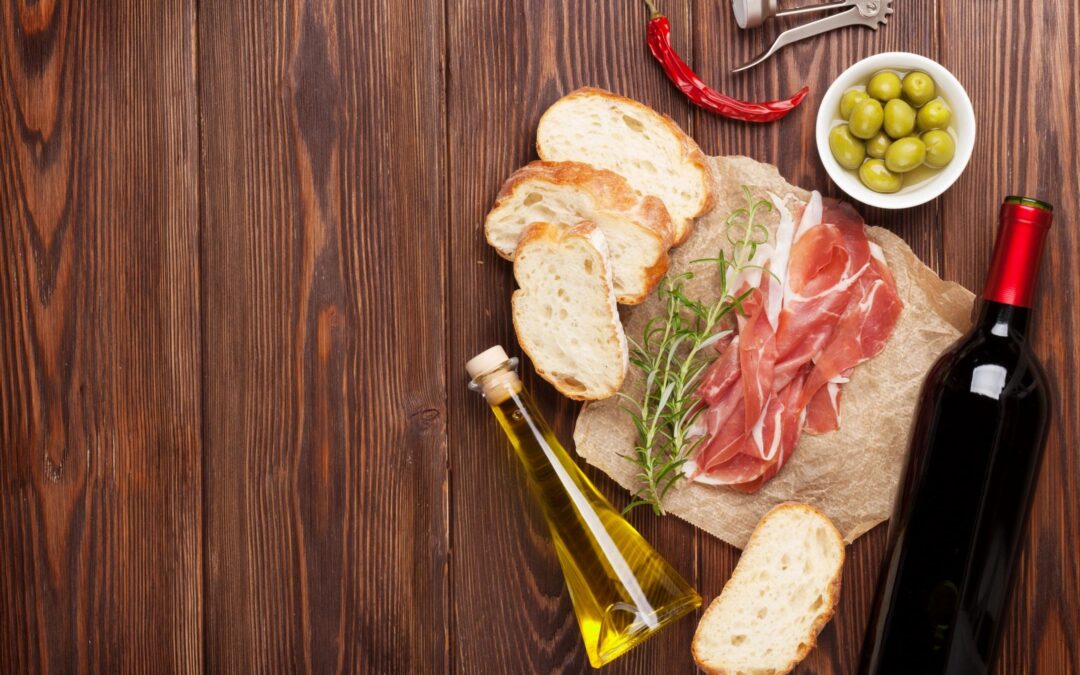
by Jessie Manderson | May 7, 2020 | Fitness
I’m sure a lot of you hear about Macronutrients and I’m sure some of you probably roll your eyes hearing people in the fitness and health industry talk about them all the time. BUT I’m here to explain to you WHY they are so important.
Macronutrients consist of carbohydrates, proteins and fats. They are essential and can be detrimental to your health if you do not consume the right amount for your body. They affect your ability to digest and absorb food; hormone production; immunity; cell structure and function; body composition and metabolic function.
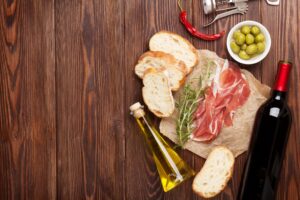 It’s important to eat a variety of natural (complex) carbohydrates which are slow digesting and high fibre. Fibre cannot be produced in your body and so it’s important you are getting it from the foods you eat. Complex carbs include fruit and vegetables; legumes and root vegetables; beans and whole grains. If you are looking to gain weight/muscle mass, you should consume faster digesting, low fibre foods. But remember, everyBODY is different and some may have different effects in the body. (Simple carbs mainly for high-level athletes and those underweight)
It’s important to eat a variety of natural (complex) carbohydrates which are slow digesting and high fibre. Fibre cannot be produced in your body and so it’s important you are getting it from the foods you eat. Complex carbs include fruit and vegetables; legumes and root vegetables; beans and whole grains. If you are looking to gain weight/muscle mass, you should consume faster digesting, low fibre foods. But remember, everyBODY is different and some may have different effects in the body. (Simple carbs mainly for high-level athletes and those underweight)
You can find two types of carbohydrates, soluble and insoluble. I won’t go into too much detail here but your water-soluble carbs which are oats, beans, peas, nuts, dried beans, barley, flax, chia, oranges, blueberries, bananas, apples, artichoke, tomatoes and carrots. These aid in excreting bile acids and sex hormone metabolites. Insoluble carbs are found in plant cell walls such as celery, root vegetable, dark green leafy veg, fruit and veg skin, whole-grain seed hulls, seeds and nuts. This adds bulk to your stool which means… regular bowel movements every day!
Both insoluble and soluble carbohydrates help you to:
- Feel full longer;
- Lower blood lipids + cholesterol;
- Lower chance of colon cancer;
- Keep things moving in your GI Tract;
- Boost gut health.
Carbohydrates are important to consume with every meal (unless given instructions otherwise due to diabetes or other medical conditions). It is especially important to eat carbohydrates before + after your workout.
Now let us move onto fats! Including fats in your diet are important as they:
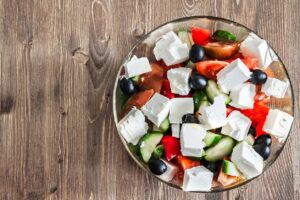 Provide energy (most energy-dense macronutrient);
Provide energy (most energy-dense macronutrient);- Balance hormones (sex and corticosteroid in particular);
- Form cell membranes;
- Form brain and nervous systems;
- Transport fat-soluble vitamins (A, D, E + K)
- Give us two important Omegas – Linoleic (Omega 6) + Linolenic (Omega 3) which can only be found in foods.
There are two types of fats – saturated + unsaturated. Saturated fats include butter, animal oil and tapioca (coconut) and unsaturated fats include olive, avocado, nuts, flax, fish and hemp. Trans fats are something you want to avoid! They lower your HDLs; suppress the excretion of bile acids; increase our cholesterol production; compete with essential fats and can create and worsen essential fatty acid deficiencies. So when you’re checking the back of any labels, make sure trans fat is at 0.
You want to make sure you’re balancing your Omega 3’s and 6’s as they function opposite to each other. Omega 3’s are important for brain development; cardiovascular functioning; nervous functioning and immune health. Omega 6’s are important for dilating airways and blood vessels; reducing pain; preventing blood clots and are anti-inflammatory.
You can find healthy fats in flax, chia, hemp, walnuts, fish, algae, avocados, poultry, wild game, beef, pork, lamb, olives and extra virgin olive oil. Don’t avoid healthy fats! They are crutial in a balanced diet!
Lastly, proteins. Proteins are broken down into amino acids which are essential to the human body. We thrive off of aminos. They help us repair and build tissues, hormones, immune system; they help us recover from surgery, illnesses or injuries and they aid in losing weight as they keep us full for longer. Without it, we would suffer from poor digestion. The average person should be consuming about 0.8-2.2kg/lb of body weight per day.
 Proteins can be found in many meats, nuts, beans, seeds, tubers, legumes and protein powders (but ensure you are getting your protein from food first). If you are plant based, make sure you are eating about 1 cup of legumes or dry beans every day as they are rich in lysine, which decreases your chance of cold sores.
Proteins can be found in many meats, nuts, beans, seeds, tubers, legumes and protein powders (but ensure you are getting your protein from food first). If you are plant based, make sure you are eating about 1 cup of legumes or dry beans every day as they are rich in lysine, which decreases your chance of cold sores.
I know this is a lot of information to take in, but I also want to touch briefly on sustainable eating. We need to protect our earth and support our locals. Which is why I want you to consider a couple of things when shopping for foods:
- Try to get all foods from local business such as farmers markets and buy the fruits and veg in season;
- Cut down on packaging (less plastic and waste);
- Give your leftovers to animals;
- Composte and recycle scraps;
- Buy ONLY what you need – not what you think you may need;
- Plan your meals out properly – less waste.
We must all do our part to help the environment! We only get one world.
As you can see, macronutrients are vital to keeping us alive and healthy. If you have any questions regarding macronutrients or are unsure about how much protein, carbs and fats you should be eating every day, sign up for my 8 week nutrition program where I can help you and give your tips and tricks to better your health today!
Jess x
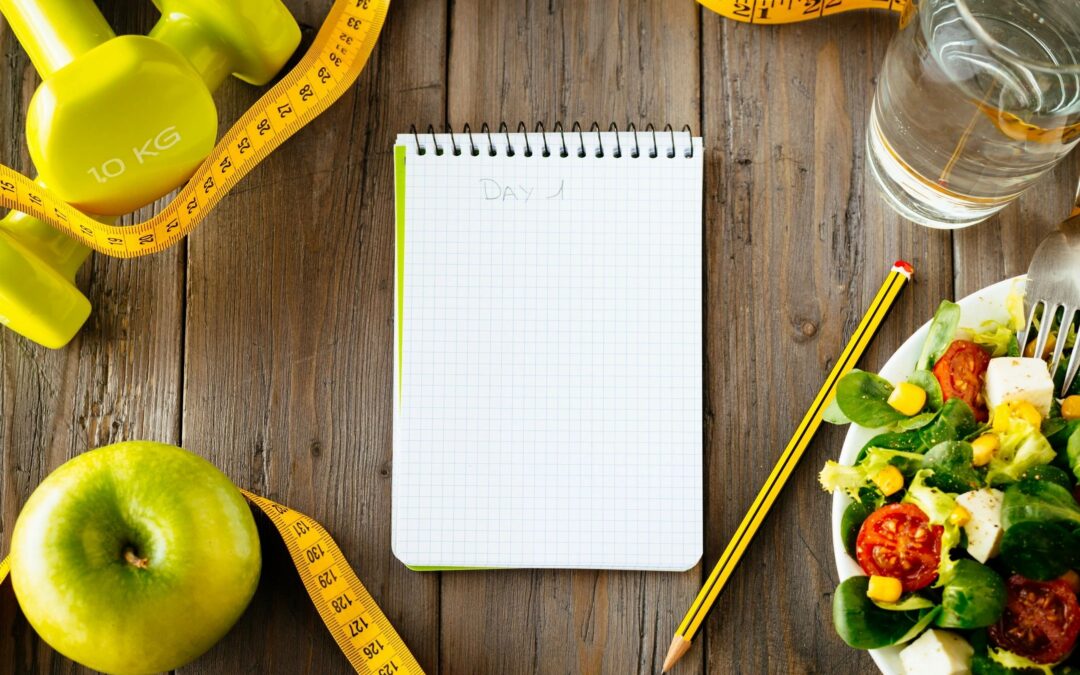
by Jessie Manderson | May 6, 2020 | Fitness
As you may or may not already know, I am a Certified Nutrition Coach as well as a Personal Trainer. I am offering Nutrition Coaching to you and here’s a bit about what we will go through…
When you sign up, you will be asked to fill out a questionnaire. There are quite a few questions but they’re essential in planning the perfect program tailored to your individual needs + requirements. This should be submitted before our first session so I can get to know you before we plan!

Together we will figure out how we will reach your goals in a maintainable way. I will teach you some tips + tricks to living a healthy and ENJOYING it.
Nutrition is such an important part of a healthy lifestyle. What you feed your body is a reflection of yourself. If you eat good, you look good + feel good!
Food is so much more than just fuel for your body. It has a HUGE impact on your immunity; hormone production; cell structure and function; body composition; metabolic + cognitive function and so much more!
When you’re ready, you can sign up for coaching sessions with me today!
Jess x

by Jessie Manderson | May 5, 2020 | Fitness
Just want to briefly share what I learned from the virtual retreat I did on Friday & Saturday.
The retreat was hosted by Suzanne Khan of Naked Zero and Nat from Shamana Circle in Bermuda.
There were lots of different ‘activities’ such as learning to cook plant based meals, make mocktails, HIIT, meditation and yoga classes, starting and/or growing a business during this time. But the one that stuck out to ME the most was the manifestation journaling.
 We started out with a quick meditation to help us feel the energy before we started to write. Sue had us focus our energy on our palms and for me, they started to feel warm. This got our hands ready to write down all of the things we would like to manifest!
We started out with a quick meditation to help us feel the energy before we started to write. Sue had us focus our energy on our palms and for me, they started to feel warm. This got our hands ready to write down all of the things we would like to manifest!
She had us think about exactly what we wanted and write it down in great detail. As if we already had it. (Eg. If you want 1 million dollars write down, “I have just received 1 million dollars”)
This may sound way too out of reach for you at the moment. If you feel like it is, then write down something smaller such as, “I have just received $100,000” and if this seems like too much right now. Make the number smaller.
down something smaller such as, “I have just received $100,000” and if this seems like too much right now. Make the number smaller.
The reason for this is because if you don’t 100% in your mind and body that this is unachievable at this moment, the universe (or what/whoever you believe in) won’t be able to give it to you.
Once you have everything you’d like to manifest into your life written down, add this at the end…. “Give this to me or something better.” Because you may have put down $100 and the universe may decide to give you $1000 instead.
The next step was gratitude journaling. She asked us to write down somethings we are grateful for and why. It is more important to write down the why because it shows yourself that you truly are grateful and just not writing things down to fill the pages.
Once you have written this down, Sue says, “close your book & let the universe do its thing.” ✨
 You are probably wonder why I post this blog on my fitness + health website… Because your mental health is just as important as exercising and eating well. I want you to live a healthy life all round and as a nutrition coach and personal trainer, I am qualified to help you with managing different stressors in your life. I believe that working together, we can help you live a healthier lifestyle.
You are probably wonder why I post this blog on my fitness + health website… Because your mental health is just as important as exercising and eating well. I want you to live a healthy life all round and as a nutrition coach and personal trainer, I am qualified to help you with managing different stressors in your life. I believe that working together, we can help you live a healthier lifestyle.
Jess x
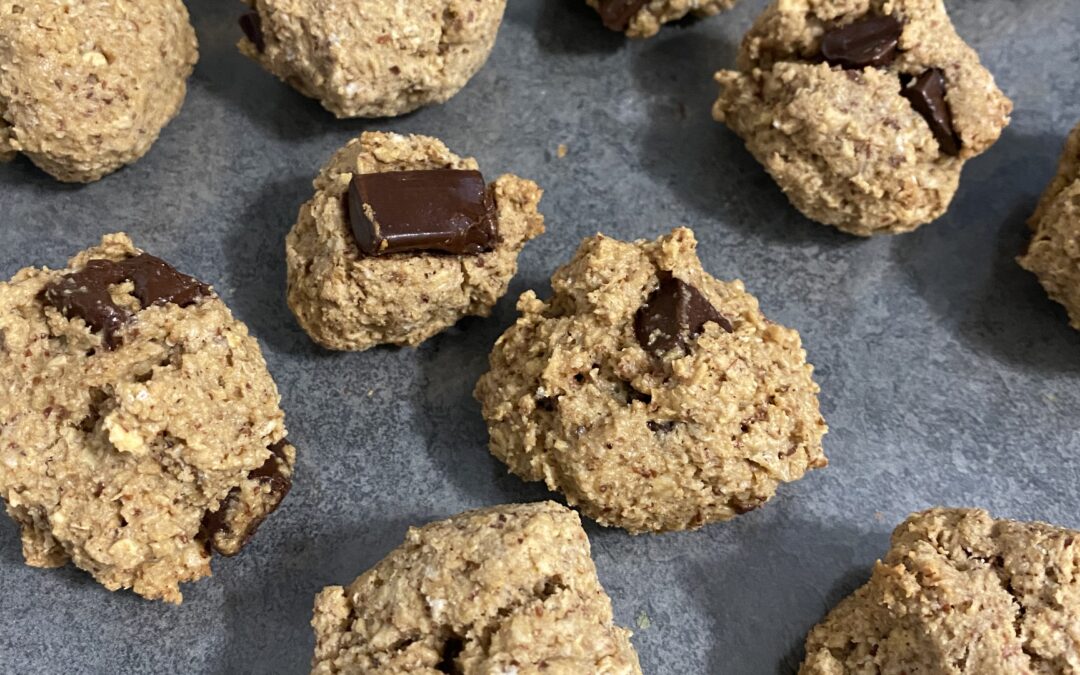
by Jessie Manderson | May 2, 2020 | Fitness
Hey guys!
I’ve been trying to perfect my chocolate chips cookies for YEARS & have finally found a gluten free, dairy free, healthy recipe that is also delicious!
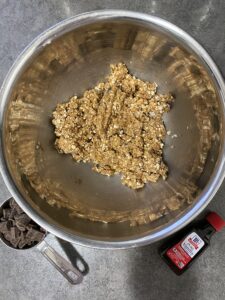
What you will need:
- Bowl/food processor;
- Spoon
Ingredients:
- 1 cup of GF oats;
- 1/2 cup of almond meal;
- 2 tbsp coconut sugar;
- 1 tbsp coconut oil;
- 1tsp of baking power;
- 1 egg
- 1/2 cup of DF chunky chocolate chips
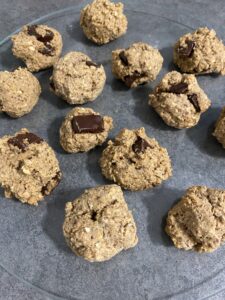
Bowl: Mix all dry ingredients together in a bowl, then add coconut oil and egg. Don’t melt the coconut oil as it will make the cookies spread in the oven. Then add chocolate chips
Food Processor: Mix in all the ingredients together, add chocolate chips at then end.
Preheat oven to 350º and bake for 15 mins (keep checking on them).
Hope you guys enjoy them as much as I do!
Jess x

by Jessie Manderson | Apr 26, 2020 | Fitness
Have you ever thought about buying an eBook because you’re struggling to think of workouts or you think you’ll end up looking like the girl who wrote it? I encourage you to think about this long and hard again. Here’s why…
Everyone is different. We all have different body types, genetic makeups, live in different environments, do different things that keep us busy all day or some of you may be pretty sedentary.
 I’m not writing this post to criticize anyone. eBook workouts can be great for some people and are also a great way for people to make money! But they aren’t tailored to each persons individual differences.
I’m not writing this post to criticize anyone. eBook workouts can be great for some people and are also a great way for people to make money! But they aren’t tailored to each persons individual differences.
So instead of investing your money into that eBook workout guide, I suggest you invest your money into a coach who can write you an individualized plan based on YOUR needs or someone who can train you in person.
The latter is also probably the safest option as the qualified trainer will ensure your safety and maximize your potential to reach your goals by ensuring good form and tapering to your health.
Sign up today to train with me as we focus on your goals!
Jess x








 Vitamin B₇ involved in DNA replication + transcription.
Vitamin B₇ involved in DNA replication + transcription.



 It’s important to eat a variety of natural (complex) carbohydrates which are slow digesting and high fibre. Fibre cannot be produced in your body and so it’s important you are getting it from the foods you eat. Complex carbs include fruit and vegetables; legumes and root vegetables; beans and whole grains. If you are looking to gain weight/muscle mass, you should consume faster digesting, low fibre foods. But remember, everyBODY is different and some may have different effects in the body. (Simple carbs mainly for high-level athletes and those underweight)
It’s important to eat a variety of natural (complex) carbohydrates which are slow digesting and high fibre. Fibre cannot be produced in your body and so it’s important you are getting it from the foods you eat. Complex carbs include fruit and vegetables; legumes and root vegetables; beans and whole grains. If you are looking to gain weight/muscle mass, you should consume faster digesting, low fibre foods. But remember, everyBODY is different and some may have different effects in the body. (Simple carbs mainly for high-level athletes and those underweight) Provide energy (most energy-dense macronutrient);
Provide energy (most energy-dense macronutrient); Proteins can be found in many meats, nuts, beans, seeds, tubers, legumes and protein powders (but ensure you are getting your protein from food first). If you are plant based, make sure you are eating about 1 cup of legumes or dry beans every day as they are rich in lysine, which decreases your chance of cold sores.
Proteins can be found in many meats, nuts, beans, seeds, tubers, legumes and protein powders (but ensure you are getting your protein from food first). If you are plant based, make sure you are eating about 1 cup of legumes or dry beans every day as they are rich in lysine, which decreases your chance of cold sores.


 We started out with a quick meditation to help us feel the energy before we started to write. Sue had us focus our energy on our palms and for me, they started to feel warm. This got our hands ready to write down all of the things we would like to manifest!
We started out with a quick meditation to help us feel the energy before we started to write. Sue had us focus our energy on our palms and for me, they started to feel warm. This got our hands ready to write down all of the things we would like to manifest! down something smaller such as, “I have just received $100,000” and if this seems like too much right now. Make the number smaller.
down something smaller such as, “I have just received $100,000” and if this seems like too much right now. Make the number smaller. You are probably wonder why I post this blog on my fitness + health website… Because your mental health is just as important as exercising and eating well. I want you to live a healthy life all round and as a nutrition coach and personal trainer, I am qualified to help you with managing different stressors in your life. I believe that working together, we can help you live a healthier lifestyle.
You are probably wonder why I post this blog on my fitness + health website… Because your mental health is just as important as exercising and eating well. I want you to live a healthy life all round and as a nutrition coach and personal trainer, I am qualified to help you with managing different stressors in your life. I believe that working together, we can help you live a healthier lifestyle.



 I’m not writing this post to criticize anyone. eBook workouts can be great for some people and are also a great way for people to make money! But they aren’t tailored to each persons individual differences.
I’m not writing this post to criticize anyone. eBook workouts can be great for some people and are also a great way for people to make money! But they aren’t tailored to each persons individual differences.
Recent Comments